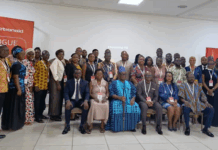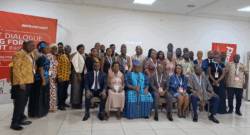At the 8th edition of the Fruits and Vegetables Fair, held in Accra, the Netherlands made a strong case for transforming Ghana’s agricultural sector, particularly in the horticultural industry.
Wendy van Meel, Deputy Head of Mission from the Royal Embassy of the Netherlands in Ghana stressed the need to shift perceptions of agriculture among the country’s youth, many of whom view the sector as labor-intensive and financially unrewarding.
Speaking at the event, the Deputy Head of Mission emphasized that agriculture, when viewed as a business, can offer significant opportunities for young people.
“The government of the Netherlands believes that it needs a joined effort to change this perspective and show the youth that farming as a business is rewarding and can build a better future,” she remarked.
The fair, organized by the Horticulture Business Platform (HBP), the Sustainable Trade Initiative (IDH), and the Ghana Vegetables Association, served as a platform to discuss the growth potential of Ghana’s horticulture industry. The Netherlands has been a key partner in supporting this sector’s development, sharing its expertise and experience from decades of agricultural advancements. The Dutch government sees Ghana as a natural partner in this space, given the shared goals of agricultural development and economic growth.
Deputy Head of Mission noted that the Netherlands, despite being a small country, has a deep-rooted agricultural tradition that has enabled it to overcome significant challenges, including feeding a growing population with limited resources.
“As a small nation with a deep-rooted agricultural tradition, the Netherlands has much to offer as a partner in this field,” she said.
The Dutch experience in increasing agricultural productivity through innovation is seen as a model that could benefit Ghana as it seeks to modernize its farming practices.
One of the major themes of the speech was the potential of horticulture to drive economic growth in Ghana. The representative pointed out that the horticulture sector already shows an average annual growth rate of 10%, underscoring the market opportunities in fruit and vegetable production.
“By investing in this sector, we can unlock even greater potential for Ghana’s economy,” she stated.
Beyond economic growth, the speech touched on the important role of horticulture in improving diets across Ghana.
The Deputy Head of Mission highlighted that vegetable consumption in the country is only half of the 400 grams recommended by health experts for daily intake. High production costs contribute to the low consumption rates, as fruits and vegetables remain relatively expensive for many Ghanaians.
Addressing these production challenges, the Netherlands has committed to partnering with local initiatives like the Horticulture Business Platform to boost the availability and affordability of nutritious produce.
Events such as the Fruits and Vegetables Fair, the Dutch representative noted, are critical for fostering the exchange of knowledge and ideas in the agricultural sector. These gatherings enable horticultural professionals to build networks and form partnerships, which are essential for creating a thriving industry.
“Events like today bring together horticultural professionals to exchange knowledge, build networks, and form partnerships—essential ingredients for a thriving sector,” the Dutch official explained.
The most pressing issue raised was youth employment in agriculture. While 35 percent of Ghana’s population works in agriculture, many young people are reluctant to enter the field, due to its negative image.
“Agriculture remains one of the largest employers in Ghana, with around 35 percent of the population—nearly 11 million people—working in the sector. However, agriculture still suffers from negative perceptions among Ghana’s youth,” the noted, calling for concerted efforts to make farming an attractive option for younger generations.










